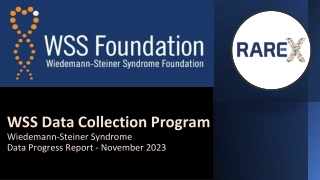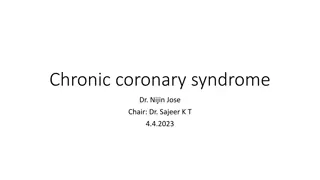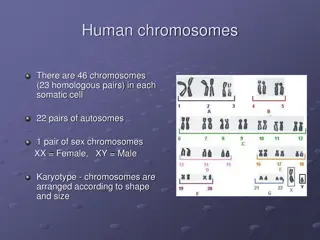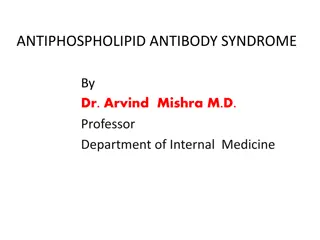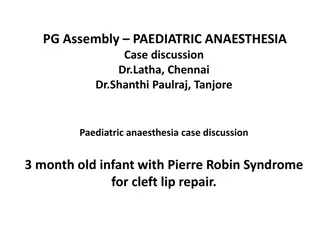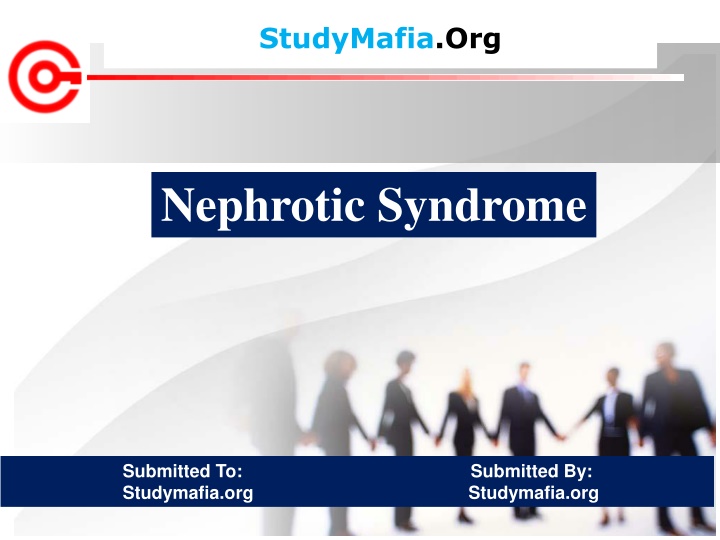
Nephrotic Syndrome: Causes, Symptoms, and Treatment
Nephrotic syndrome is a kidney condition characterized by proteinuria, high cholesterol, low albumin levels, and swelling. Learn about the causes, symptoms, and treatment options for this condition to better manage it.
Download Presentation

Please find below an Image/Link to download the presentation.
The content on the website is provided AS IS for your information and personal use only. It may not be sold, licensed, or shared on other websites without obtaining consent from the author. If you encounter any issues during the download, it is possible that the publisher has removed the file from their server.
You are allowed to download the files provided on this website for personal or commercial use, subject to the condition that they are used lawfully. All files are the property of their respective owners.
The content on the website is provided AS IS for your information and personal use only. It may not be sold, licensed, or shared on other websites without obtaining consent from the author.
E N D
Presentation Transcript
StudyMafia.Org Nephrotic Syndrome Submitted To: Submitted By: Studymafia.org Studymafia.org
Table Contents Definition Introduction Symptoms of Nephrotic Syndrome Causes of Nephrotic Syndrome Treatment of Nephrotic Syndrome Complications of Nephrotic Syndrome Conclusion 2
Definition Nephrotic syndrome happens when damage to your kidneys causes these organs to release too much protein into your urine. 3
Introduction Nephrotic syndrome is characterized by the following: a high amount of protein present in the urine (proteinuria) high cholesterol and triglyceride levels in the blood (hyperlipidemia) low levels of a protein called albumin in the blood (hypoalbuminemia) swelling (edema), particularly in your ankles and feet, and around your eyes 4
Causes of Nephrotic Syndrome Your kidneys are filled with tiny blood vessels called glomeruli. As your blood moves through these vessels, extra water and waste products are filtered into your urine. Protein and other substances that your body needs stay in your bloodstream. Without albumin, your body holds on to the extra fluid. This causes swelling (edema) in your legs, feet, ankles, and face. 6
Causes of Nephrotic Syndrome Nephrotic syndrome happens when the glomeruli are damaged and can t properly filter your blood. Damage to these blood vessels allows protein to leak into your urine. Albumin is one of the proteins lost in your urine. Albumin helps pull extra fluid from your body into your kidneys. This fluid is then removed in your urine. 7
Causes of Nephrotic Syndrome Focal segmental glomerulosclerosis (FSGS): This is a condition in which the glomeruli become scarred from disease, a genetic defect, or an unknown cause. Membranous nephropathy: In this disease, the membranes in the glomeruli thicken. The cause of the thickening isn t known, but it may occur along with lupus, hepatitis B, malaria, or cancer. 8
Causes of Nephrotic Syndrome Minimal change disease: For a person with this disease, kidney tissue looks normal under a microscope. But for some unknown reason, it doesn t filter properly. Renal vein thrombosis: In this disorder, a blood clot blocks a vein that drains blood out of the kidney. 9
Causes of Nephrotic Syndrome Diabetes: In this disease, uncontrolled blood sugar can damage blood vessels all over your body, including in your kidneys. Lupus: Lupus is an autoimmune disease that causes inflammation in the joints, kidneys, and other organs. Amyloidosis: This rare disease is caused by a buildup of the protein amyloid in your organs. 10
Treatment of Nephrotic Syndrome Blood pressure medications: These can help to lower blood pressure and reduce the amount of protein lost in the urine. These medications include angiotensin-converting enzyme (ACE) inhibitors and angiotensin II receptor blockers (ARBs). 11
Treatment of Nephrotic Syndrome Diuretics: Diuretics cause your kidneys to release extra fluid, which brings down swelling. These medications include things like furosemide (Lasix) and spironolactone (Aldactone). Statins: These drugs lower cholesterol levels. Some examples of stains include atorvastatin calcium (Lipitor) and lovastatin (Altoprev, Mevacor). 12
Treatment of Nephrotic Syndrome Immune system suppressants: These drugs help keep the immune system under control and can be helpful for treating an underlying condition like lupus. An example of an immune-suppressing medication is corticosteroids. 13
Complications of Nephrotic Syndrome Blood clots: Proteins that prevent clotting can be lost from the blood, raising your risk of blood clots. High cholesterol and triglycerides: More cholesterol and triglycerides can be released into your blood. This can raise your risk of heart disease. High blood pressure: Kidney damage can increase the amount of waste products in your blood. This can raise blood pressure. 14
Complications of Nephrotic Syndrome Malnutrition: Loss of protein in the blood can lead to weight loss, which may be masked by swelling (edema). Anemia: You have a lack of red blood cells to carry oxygen to the organs and tissues of your body. Chronic kidney disease: Your kidneys may lose their function over time, necessitating dialysis or a kidney transplant. 15
Complications of Nephrotic Syndrome Infections: People with nephrotic syndrome have an increased risk of getting infections, such as pneumonia and meningitis. Underactive thyroid gland (hypothyroidism): Your thyroid doesn t make enough thyroid hormone. Coronary artery disease: Narrowing of blood vessels limits blood flow to the heart. 16
Conclusion Nephrotic syndrome is a condition that causes the kidneys to leak large amounts of protein into the urine. This can lead to a range of problems, including swelling of body tissues and a greater chance of catching infections. 17
References Google.com Wikipedia.org Studymafia.org Slidespanda.com
Thanks To StudyMafia.org


![❤[PDF]⚡ Zee Zee Does It Anyway!: A Story about down Syndrome and Determination](/thumb/20462/pdf-zee-zee-does-it-anyway-a-story-about-down-syndrome-and-determination.jpg)
